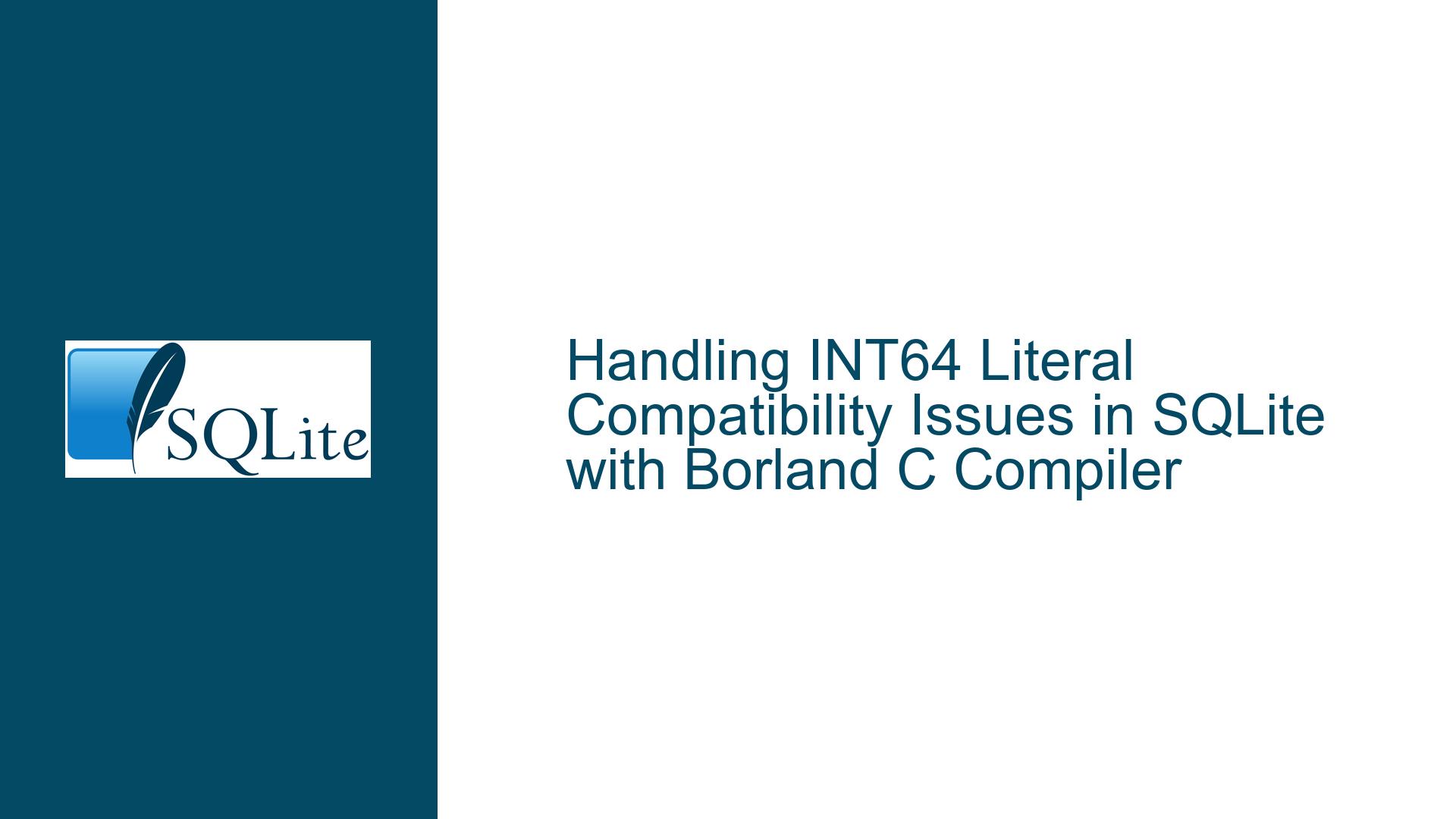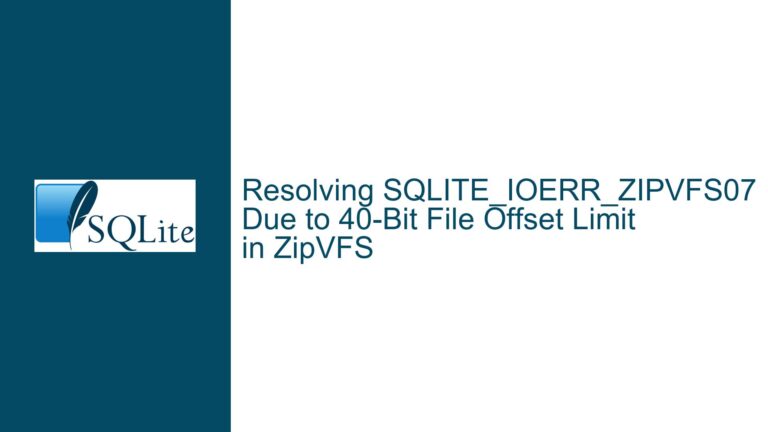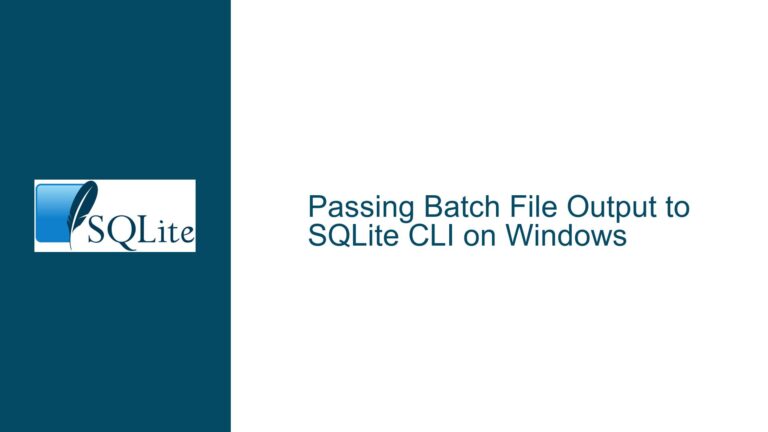Handling INT64 Literal Compatibility Issues in SQLite with Borland C Compiler
Issue Overview: INT64 Literal Syntax Incompatibility with Borland C Compiler
The core issue revolves around the incompatibility of the Borland C 5.5.1 compiler with the standard LL suffix used for defining 64-bit integer literals in SQLite. The LL suffix is a common convention in modern C compilers to denote a 64-bit integer literal. However, the Borland C compiler, particularly version 5.5.1, does not recognize this syntax. Instead, it requires the use of the i64 suffix for 64-bit integer literals. This discrepancy leads to compilation errors when attempting to build SQLite with the Borland C compiler.
The problem is particularly evident in the SQLite amalgamation source code, where 64-bit integer literals are used extensively. For instance, in the function sqlite3GetUInt32, a 64-bit integer literal is used to check if a value exceeds a certain threshold. The literal 4294967296LL is used, which is incompatible with the Borland C compiler. This incompatibility is not limited to a single instance; there are 19 such literals in the SQLite 3.37.0 amalgamation, making it a widespread issue that needs to be addressed for successful compilation.
The issue is further complicated by the fact that the Borland C compiler is an older compiler, and its syntax requirements differ from those of modern compilers. This means that developers working with Borland C need to modify the SQLite source code to replace the LL suffix with i64 to ensure compatibility. However, this modification must be done carefully to avoid introducing errors or inconsistencies in the code.
Possible Causes: Compiler-Specific Syntax Requirements and Historical Context
The root cause of this issue lies in the historical evolution of C compilers and their handling of 64-bit integer literals. The LL suffix for 64-bit integer literals is a relatively recent addition to the C language standard, and older compilers like Borland C 5.5.1 were developed before this convention became widely adopted. As a result, these older compilers use different syntax for defining 64-bit integer literals, such as the i64 suffix.
Another contributing factor is the lack of standardization in the early days of C programming. Different compiler vendors implemented their own syntax for handling 64-bit integers, leading to fragmentation and incompatibility across different compilers. This lack of standardization has persisted in some legacy compilers, making it difficult to use modern codebases with older compilers without modification.
The issue is also exacerbated by the fact that SQLite is designed to be highly portable, with a single amalgamation source file that can be compiled on a wide range of platforms and compilers. While this design choice has many advantages, it also means that SQLite must accommodate the quirks and limitations of older compilers like Borland C. This requires careful handling of compiler-specific syntax and the use of preprocessor directives to ensure compatibility across different environments.
Troubleshooting Steps, Solutions & Fixes: Modifying SQLite Source Code for Borland C Compatibility
To resolve the issue of INT64 literal incompatibility with the Borland C compiler, several steps can be taken. The most straightforward approach is to modify the SQLite source code to replace the LL suffix with i64 wherever 64-bit integer literals are used. This can be done manually or with the help of automated tools, but care must be taken to ensure that the replacements are accurate and do not introduce new issues.
One effective solution is to use preprocessor directives to define a macro that handles the 64-bit integer literal syntax based on the compiler being used. For example, the following macro can be defined to conditionally use the appropriate suffix for 64-bit integer literals:
#ifdef __BORLANDC__
#define INT64_LITERAL(V) (V##i64)
#else
#define INT64_LITERAL(V) (V##LL)
#endif
This macro can then be used throughout the SQLite source code to define 64-bit integer literals in a way that is compatible with both Borland C and modern compilers. For example, the literal 4294967296LL can be replaced with INT64_LITERAL(4294967296), ensuring that the correct syntax is used based on the compiler.
Another approach is to use a regular expression-based tool to automate the replacement of LL suffixes with i64 in the SQLite source code. This can be particularly useful when dealing with a large number of literals, as it reduces the risk of human error and speeds up the modification process. However, it is important to carefully review the results of any automated replacements to ensure that they are accurate and do not introduce unintended changes to the code.
In addition to modifying the source code, it is also important to test the modified code thoroughly to ensure that it compiles and runs correctly with the Borland C compiler. This includes running the SQLite test suite to verify that the modifications have not introduced any regressions or new issues. If any issues are found, they should be addressed promptly to ensure the stability and reliability of the modified code.
Finally, it is worth considering the long-term maintenance implications of these modifications. While the use of preprocessor directives and automated tools can help to mitigate the impact of compiler-specific syntax requirements, it is important to document these modifications clearly and ensure that they are kept up to date with future versions of SQLite. This may involve periodically reviewing and updating the modifications to ensure compatibility with new versions of the Borland C compiler and other compilers that may be used in the future.
In conclusion, the issue of INT64 literal incompatibility with the Borland C compiler can be resolved through careful modification of the SQLite source code, the use of preprocessor directives, and thorough testing. By taking these steps, developers can ensure that SQLite can be successfully compiled and used with the Borland C compiler, while maintaining compatibility with modern compilers and preserving the portability and reliability of the SQLite codebase.






